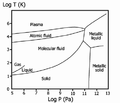Hydrogen
Hydrogen is a chemical element with the symbol H and atomic number 1. It is the lightest and most abundant chemical substance in the universe, constituting roughly 75% of its elemental mass.<ref>https://www.wikimd.com/wiki/Hydrogen</ref>
Characteristics[edit]
Hydrogen is the lightest element. Under standard conditions, it is a colorless, tasteless, and odorless gas. Hydrogen is the only element that can exist without neutrons in its nucleus. This form of hydrogen, known as Protium, has one proton and one electron.
Uses[edit]
Hydrogen has a variety of uses. It is used in the production of ammonia for fertilizer via the Haber process, and in hydrocracking, where it is used to convert crude oil into gasoline. Hydrogen is also used in the production of methanol and in hydrogenation of fats and oils. It is also used in rocket fuel and in fuel cells for generating electrical power.
Production[edit]
Hydrogen is produced from a variety of sources such as fossil fuels, water and renewables. The most common method of production is steam reforming of natural gas. Other methods include electrolysis of water and thermochemical cycles.
Safety[edit]
Hydrogen is highly flammable and can form explosive mixtures in air. It can cause burns and eye damage. However, it is not considered a health hazard because it does not have any known toxic effects.
See also[edit]
References[edit]
<references />
|
|
|
-
Explosion of a mixture of hydrogen and air
-
Shuttle Main Engine Test Firing
-
Hydrogen atom
-
Hydrogen ampoule
-
Phase diagram of hydrogen
-
Hydrogen isotopes
-
Hydrogen discharge tube
-
Deuterium discharge tube
-
Portrait of Robert Boyle
-
Antoine-Laurent Lavoisier
-
Emission spectrum of hydrogen
-
Hindenburg over New York 1937
Ad. Transform your life with W8MD's Budget GLP-1 injections from $75


W8MD offers a medical weight loss program to lose weight in Philadelphia. Our physician-supervised medical weight loss provides:
- Weight loss injections in NYC (generic and brand names):
- Zepbound / Mounjaro, Wegovy / Ozempic, Saxenda
- Most insurances accepted or discounted self-pay rates. We will obtain insurance prior authorizations if needed.
- Generic GLP1 weight loss injections from $75 for the starting dose.
- Also offer prescription weight loss medications including Phentermine, Qsymia, Diethylpropion, Contrave etc.
NYC weight loss doctor appointmentsNYC weight loss doctor appointments
Start your NYC weight loss journey today at our NYC medical weight loss and Philadelphia medical weight loss clinics.
- Call 718-946-5500 to lose weight in NYC or for medical weight loss in Philadelphia 215-676-2334.
- Tags:NYC medical weight loss, Philadelphia lose weight Zepbound NYC, Budget GLP1 weight loss injections, Wegovy Philadelphia, Wegovy NYC, Philadelphia medical weight loss, Brookly weight loss and Wegovy NYC
|
WikiMD's Wellness Encyclopedia |
| Let Food Be Thy Medicine Medicine Thy Food - Hippocrates |
Medical Disclaimer: WikiMD is not a substitute for professional medical advice. The information on WikiMD is provided as an information resource only, may be incorrect, outdated or misleading, and is not to be used or relied on for any diagnostic or treatment purposes. Please consult your health care provider before making any healthcare decisions or for guidance about a specific medical condition. WikiMD expressly disclaims responsibility, and shall have no liability, for any damages, loss, injury, or liability whatsoever suffered as a result of your reliance on the information contained in this site. By visiting this site you agree to the foregoing terms and conditions, which may from time to time be changed or supplemented by WikiMD. If you do not agree to the foregoing terms and conditions, you should not enter or use this site. See full disclaimer.
Credits:Most images are courtesy of Wikimedia commons, and templates, categories Wikipedia, licensed under CC BY SA or similar.
Translate this page: - East Asian
中文,
日本,
한국어,
South Asian
हिन्दी,
தமிழ்,
తెలుగు,
Urdu,
ಕನ್ನಡ,
Southeast Asian
Indonesian,
Vietnamese,
Thai,
မြန်မာဘာသာ,
বাংলা
European
español,
Deutsch,
français,
Greek,
português do Brasil,
polski,
română,
русский,
Nederlands,
norsk,
svenska,
suomi,
Italian
Middle Eastern & African
عربى,
Turkish,
Persian,
Hebrew,
Afrikaans,
isiZulu,
Kiswahili,
Other
Bulgarian,
Hungarian,
Czech,
Swedish,
മലയാളം,
मराठी,
ਪੰਜਾਬੀ,
ગુજરાતી,
Portuguese,
Ukrainian











